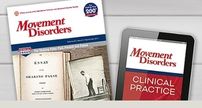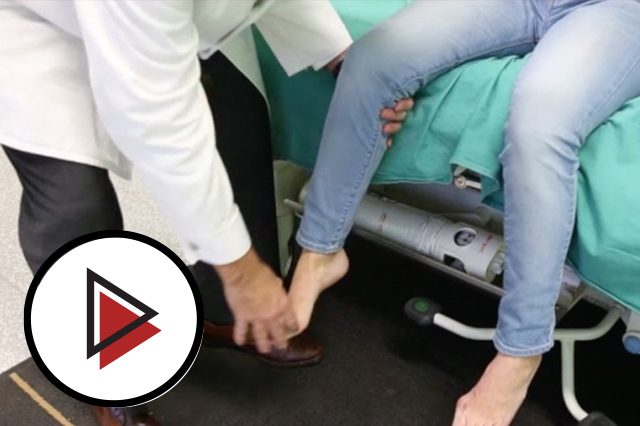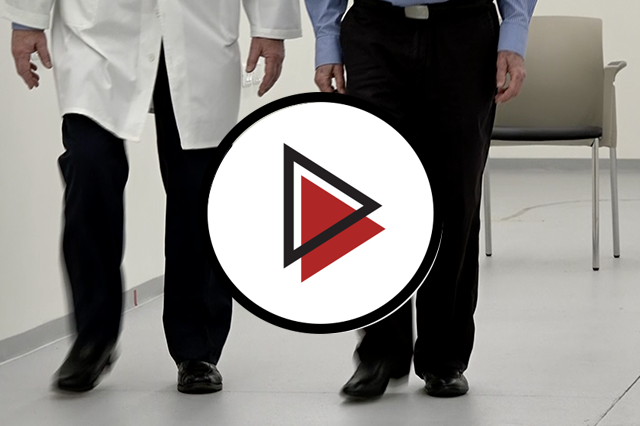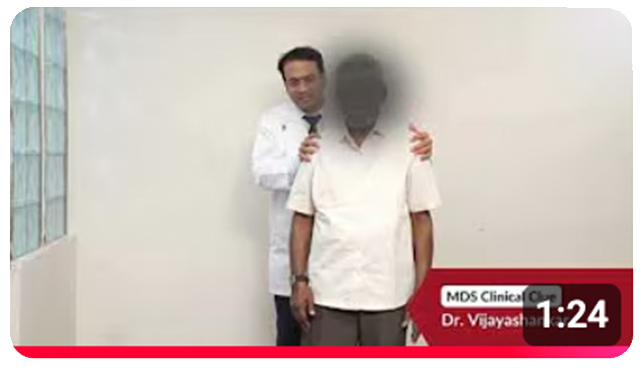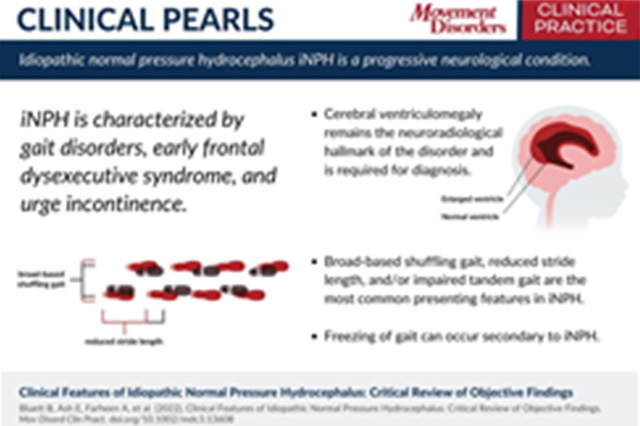
Clinical Resources
Explore the most up-to-date clinical guidelines, tools, courses, and more.
Resources
By Disease
Find clinical resources and information for common movement disorders:
Clinical Tools
Evidence-Based Medicine Reviews
Review the latest recommendations from MDS's Evidence-Based Medicine Reviews, which use a rigorous methodological approach to outline treatment options.
For Underserved Areas & PopulationsResources to help you better understand and address the needs of a variety of underserved patients. |
Education
Courses for Clinicians
Browse live, in-person and on-demand courses tailored to clinicial care.
Journal CME 41.02: Polyelectromyography Under Propofol to Differentiate Functional from Idiopathic Dystonia: A Pilot Study
On Demand
60 Minutes
Experienced / Intermediate
1076 <p>The Journal CME 41.02 article aims to investigate potential differences in muscle activity between ID and FD patients using polyelectromyography (PEMG) under anesthesia.</p> Biomarkers, Biomarkers & Diagnostic Tools, Dystonia, Functional Movement Disorders, Genetics, Hyperkinetic Movement Disorders, Neuroimaging, Neuropathology, Other Movement Disorders, Rating Scales Roberto Eleopra, MD 60 1.00 https://education.movementdisorders.org/Detail/1076/Journal-CME-41-02:-Polyelectromyography-Under-Propofol-to-Differentiate-Functional-from-Idiopathic-Dystonia:-A-Pilot-Study https://education.movementdisorders.org/Upload/ActivityImages/Journal-CME562837664663.jpg 2026-02-19T00:00:00 2027-02-19T00:00:00 <p><strong>ACCREDITATION STATEMENT</strong></p><p>This activity has been planned and implemented in accordance with the accreditation requirements and policies of the Accreditation Council for Continuing Medical Education (ACCME). The International Parkinson and Movement Disorder Society is accredited by the ACCME to provide continuing medical education for physicians.</p><p><br></p><p><strong>CREDIT DESIGNATION STATEMENT</strong></p><p>The International Parkinson and Movement Disorder Society designates this activity for a maximum of 1 <em>AMA PRA Category 1 Credits™</em>. Physicians should only claim credit commensurate with the extent of their participation.</p><p><br></p><p><strong>FACULTY DISCLOSURE</strong></p><p>All individuals in control of content for this activity are required to disclose all financial relationships with ineligible companies (as defined by the ACCME) over the last 24 months. Disclosure information is available <a href="https://d1t84l7yt030ad.cloudfront.net/FroalaFiles/Journal%20CME%2041.02%20-%20Disclosures_16022026081618.pdf" rel="noopener noreferrer" target="_blank"><u>HERE</u></a>. All relevant financial relationships have been mitigated in advance of this program.</p><p><br></p><p><strong>METHOD OF PARTICIPATION</strong></p><p>Each module will take approximately one (1) hour to complete. Upon reading the article, participants will take a post-test and must receive a grade of 75% or higher to pass. Participants are allowed multiple attempts to complete the post-test. Once the post-test is passed, participants are required to complete the module evaluation.</p><p><br></p><p><strong>SATISFACTORY COMPLETION</strong></p><p>Participants must complete an evaluation for each session they attend to receive continuing medical education credit. Your chosen session(s) must be attended in their entirety. Partial credit for individual sessions is not available.</p><p><br></p><p><strong>CONTENT VALIDITY STATEMENT</strong></p><p>All recommendations involving clinical medicine in MDS activities are based on evidence that is accepted within the profession of medicine as adequate justification for their indications and contraindications in the case of patients. All scientific research referred to, reported or used in CME in support or justification of a patient care recommendations conforms to the generally accepted standards of experimental design, data collection and analysis. Activities that promote recommendations, treatment or manners of practicing medicine not within the definition of CME or are knowing to have risks or dangers that outweigh the benefits or are knowing to be ineffective in the treatment of patients do not constitute valid CME.</p> MDS Education <p><strong>COURSE PURPOSE</strong></p><p>Journal CME highlights various articles covering relevant issues, developments and research topics in the area of movement disorders. Articles are selected from Movement Disorders, the official Journal of the International Parkinson and Movement Disorder Society.</p><p><br></p><p><strong>LEARNING OBJECTIVES</strong></p><p>Upon completion of this activity, learners will be able to:</p><p>1. Understand the diagnostic overlap between functional and idiopathic dystonia and the need for objective biomarkers</p><p>2. Evaluate the role of sedation-based PEMG findings in differentiating FD from ID</p><p>3. Assess the clinical utility and limitations of EMG patterns under anesthesia in the diagnostic workup of dystonia</p><p><br></p><p><strong>INTENDED AUDIENCE</strong></p><p>This activity is intended for clinicians, other health professionals, researchers, policy makers from throughout the world, both MDS members and non-members, who interact with patients living with Movement Disorders.</p><p><br></p><p><strong>HARDWARE AND SOFTWARE REQUIREMENTS</strong></p><p>1. Active Internet connection (DSL or Cable). Dial-up connection will have constant buffering problem.</p><p>2. Compatible with Windows PC and MAC (256 MB of RAM or higher).</p><p>3. Activity is best viewed on Internet Explorer 9.0 or higher, Safari 5.0 or higher and Firefox 29.0 or higher.</p><p>4. Adobe Flash Player 12.0 (or higher).</p><p>5. Adobe Reader to print certificate.</p> 0 /Courses/Journal-CME-41.02-Polyelectromyography-Under-Propofol-to-Differentiate-Functional-from-Idiopathic-Dystonia-A-Pilot-Study.htm Journal CME 41.02: Polyelectromyography Under Propofol to Differentiate Functional from Idiopathic Dystonia: A Pilot Study Journal CME 41.02 2026-02-19T09:01:11.360 0 0 Experienced / Intermediate On-Demand Biomarkers & Diagnostic Tools Hyperkinetic Movement Disorders Other Movement Disorders
Genetic Counseling in Parkinson's Disease
On Demand
60 Minutes
Foundational / Beginner
1050 Genetics has become an important clinical tool and can also identify people at risk for disease. This is an introductory module on genetic counseling and testing for Parkinson’s disease and includes some of the most important aspects to consider. Biomarkers & Diagnostic Tools, Genetics, Parkinson Disease/Hypokinetic Movement Disorders, Parkinson's Disease (PD) Deborah Raymond, MS, CGC, Maya Rawal, MS, CGC, Rachel Saunders Pullman, MD, MPH , MS 60 1.00 https://education.movementdisorders.org/Detail/1050/Genetic-Counseling-in-Parkinson's-Disease https://education.movementdisorders.org/Upload/ActivityImages/05INTERACT-45-001-Genetic-Counseling-202x108969975.jpg 2026-02-16T00:00:00 2029-02-16T00:00:00 <p><strong>ACCREDITATION STATEMENT</strong></p><p>This activity has been planned and implemented in accordance with the accreditation requirements and policies of the Accreditation Council for Continuing Medical Education (ACCME). The International Parkinson and Movement Disorder Society is accredited by the ACCME to provide continuing medical education for physicians.</p><p><br></p><p><strong>CREDIT DESIGNATION STATEMENT</strong></p><p>The International Parkinson and Movement Disorder Society designates this activity for a maximum of 1 <em>AMA PRA Category 1 Credits™</em>. Physicians should only claim credit commensurate with the extent of their participation.</p><p><br></p><p><strong>FACULTY DISCLOSURE</strong></p><p>All individuals in control of content for this activity are required to disclose all financial relationships with ineligible companies (as defined by the ACCME) over the last 24 months. Disclosure information is available <a class="fr-file" href="https://d1t84l7yt030ad.cloudfront.net/FroalaFiles/Disclosures - Genetic Counseling in Parkinson's Disease _17122025113848.pdf" rel="noopener noreferrer" target="_blank">HERE.</a> All relevant financial relationships have been mitigated in advance of this program.</p><p><br></p><p><strong>SATISFACTORY COMPLETION</strong></p><p>Participants must complete an evaluation for each session they attend to receive continuing medical education credit. Your chosen session(s) must be attended in their entirety. Partial credit for individual sessions is not available.</p><p><br></p><p><strong>METHOD OF PARTICIPATION </strong></p><p>Your chosen sessions must be attended in their entirety. Partial credit of individual sessions is not available. If you are seeking continuing education credit for a specialty not listed in the Accreditation Statement, it is your responsibility to contact your licensing/certification board to determine course eligibility for your board requirement.</p><p><br></p><p><strong>CONTENT VALIDITY STATEMENT</strong></p><p>All recommendations involving clinical medicine in MDS activities are based on evidence that is accepted within the profession of medicine as adequate justification for their indications and contraindications in the case of patients. All scientific research referred to, reported or used in CME in support or justification of a patient care recommendations conforms to the generally accepted standards of experimental design, data collection and analysis. Activities that promote recommendations, treatment or manners of practicing medicine not within the definition of CME or are knowing to have risks or dangers that outweigh the benefits or are knowing to be ineffective in the treatment of patients do not constitute valid CME.</p> MDS Education <p><span style="background-color: null;"><strong>FACULTY</strong></span></p><p>Deborah Raymond, MS, CGC - Mount Sinai Beth Israel Medical, New York, NY, United States</p><p>Maya Rawal, MS, CGC - Mount Sinai Beth Israel Medical, New York, NY, United States</p><p>Rachel Saunders-Pullman, MD, MPH, MS - Mount Sinai Beth Israel Medical, New York, NY, United States</p><p><br></p><p><strong>LEARNING OBJECTIVES</strong></p><p>Upon completion of this activity, learners will be able to: </p><p>1. Understand the principal components of genetic counseling for Parkinson’s disease</p><p>2. Understand the most common genetic contributors to Parkinson’s disease </p><p>3. Understand genetic testing types</p><p>4. Understand the meaning of test results and how genetic variants are interpreted</p><p><br></p><p><strong>INTENDED AUDIENCE</strong></p><p>This activity is intended for students, residents, primary care providers, internists, allied health, non-neurology specialists, and industry who have limited to no movement disorder experience.</p><p><br></p><p><strong>HARDWARE AND SOFTWARE REQUIREMENTS</strong></p><p>1. Active Internet connection (DSL or Cable). Dial-up connection will have constant buffering problem.</p><p>2. Compatible with Windows PC and MAC (256 MB of RAM or higher).</p><p>3. Activity is best viewed on Internet Explorer 9.0 or higher, Safari 5.0 or higher and Firefox 29.0 or higher.</p><p>4. Adobe Flash Player 12.0 (or higher).</p><p>5. Adobe Reader to print certificate.</p> 0 /Courses/Genetic-Counseling-in-Parkinsons-Disease.htm Genetic Counseling in Parkinson's Disease 2026-02-16T15:01:04.617 0 0 Foundational / Beginner On-Demand Biomarkers & Diagnostic Tools Parkinson Disease/Hypokinetic Movement Disorders
Journal CME 41.01: Cerebrospinal Fluid Proenkephalin Predicts Striatal Atrophy Decades before Clinical Motor Diagnosis in Huntington's Disease
On Demand
60 Minutes
Experienced / Intermediate
1074 <p>The Journal CME 41.01 article aims to investigate cross-sectional and longitudinal associations between baseline cerebrospinal fluid (CSF) PENK concentration and regional brain atrophy, compared identified patterns with CSF neurofilament light (NfL), and evaluated PENK and NfL for discriminating between HD Integrated Staging System (HD-ISS) stage 0 versus 1 in a far-from-onset HD gene-expanded (HDGE) cohort.</p> Biomarkers, Biomarkers & Diagnostic Tools, Chorea/Huntingtons Disease (HD), Hyperkinetic Movement Disorders Mena Farag, MBBS, MRCP 60 1.00 https://education.movementdisorders.org/Detail/1074/Journal-CME-41-01:-Cerebrospinal-Fluid-Proenkephalin-Predicts-Striatal-Atrophy-Decades-before-Clinical-Motor-Diagnosis-in-Huntington's-Disease https://education.movementdisorders.org/Upload/ActivityImages/Journal-CME562837664663.jpg 2026-02-11T00:00:00 2027-02-11T00:00:00 <p><strong>ACCREDITATION STATEMENT</strong></p><p>This activity has been planned and implemented in accordance with the accreditation requirements and policies of the Accreditation Council for Continuing Medical Education (ACCME). The International Parkinson and Movement Disorder Society is accredited by the ACCME to provide continuing medical education for physicians.</p><p><br></p><p><strong>CREDIT DESIGNATION STATEMENT</strong></p><p>The International Parkinson and Movement Disorder Society designates this activity for a maximum of 1 <em>AMA PRA Category 1 Credits™</em>. Physicians should only claim credit commensurate with the extent of their participation.</p><p><br></p><p><strong>FACULTY DISCLOSURE</strong></p><p>All individuals in control of content for this activity are required to disclose all financial relationships with ineligible companies (as defined by the ACCME) over the last 24 months. Disclosure information is available <a href="https://d1t84l7yt030ad.cloudfront.net/FroalaFiles/Journal%20CME%2041.01%20-%20Disclosures_06022026033938.pdf" rel="noopener noreferrer" target="_blank"><u>HERE</u></a>. All relevant financial relationships have been mitigated in advance of this program.</p><p><br></p><p><strong>METHOD OF PARTICIPATION</strong></p><p>Each module will take approximately one (1) hour to complete. Upon reading the article, participants will take a post-test and must receive a grade of 75% or higher to pass. Participants are allowed multiple attempts to complete the post-test. Once the post-test is passed, participants are required to complete the module evaluation.</p><p><br></p><p><strong>SATISFACTORY COMPLETION</strong></p><p>Participants must complete an evaluation for each session they attend to receive continuing medical education credit. Your chosen session(s) must be attended in their entirety. Partial credit for individual sessions is not available.</p><p><br></p><p><strong>CONTENT VALIDITY STATEMENT</strong></p><p>All recommendations involving clinical medicine in MDS activities are based on evidence that is accepted within the profession of medicine as adequate justification for their indications and contraindications in the case of patients. All scientific research referred to, reported or used in CME in support or justification of a patient care recommendations conforms to the generally accepted standards of experimental design, data collection and analysis. Activities that promote recommendations, treatment or manners of practicing medicine not within the definition of CME or are knowing to have risks or dangers that outweigh the benefits or are knowing to be ineffective in the treatment of patients do not constitute valid CME.</p> MDS Education <p><strong>COURSE PURPOSE</strong></p><p>Journal CME highlights various articles covering relevant issues, developments and research topics in the area of movement disorders. Articles are selected from Movement Disorders, the official Journal of the International Parkinson and Movement Disorder Society.</p><p><br></p><p><strong>LEARNING OBJECTIVES</strong></p><p>Upon completion of this activity, learners will be able to:</p><p>1. Understand the biological rationale for CSF proenkephalin as a striatum-specific biomarker in Huntington’s disease<br>2. Assess associations between baseline CSF PENK and longitudinal regional brain atrophy compared with neurofilament light<br>3. Evaluate the role of CSF PENK in distinguishing early HD-ISS stages and its potential value for clinical trial enrichment<br><br></p><p><strong>INTENDED AUDIENCE</strong></p><p>This activity is intended for clinicians, other health professionals, researchers, policy makers from throughout the world, both MDS members and non-members, who interact with patients living with Movement Disorders.</p><p><br></p><p><strong>HARDWARE AND SOFTWARE REQUIREMENTS</strong></p><p>1. Active Internet connection (DSL or Cable). Dial-up connection will have constant buffering problem.</p><p>2. Compatible with Windows PC and MAC (256 MB of RAM or higher).</p><p>3. Activity is best viewed on Internet Explorer 9.0 or higher, Safari 5.0 or higher and Firefox 29.0 or higher.</p><p>4. Adobe Flash Player 12.0 (or higher).</p><p>5. Adobe Reader to print certificate.</p> 0 /Courses/Journal-CME-41.01-Cerebrospinal-Fluid-Proenkephalin-Predicts-Striatal-Atrophy-Decades-before-Clinical-Motor-Diagnosis-in-Huntingtons-Disease.htm Journal CME 41.01: Cerebrospinal Fluid Proenkephalin Predicts Striatal Atrophy Decades before Clinical Motor Diagnosis in Huntington's Disease Journal CME 41.01 2026-02-11T12:01:11.930 0 0 Experienced / Intermediate On-Demand Biomarkers & Diagnostic Tools Hyperkinetic Movement Disorders
Tremor from Basic Science to Clinical Diagnosis and Therapy
In-Person
Salerno
Sep 18, 2026 - Sep 19, 2026
Experienced / Intermediate
1073 During the <em>MDS-ES Tremor from Basic Science to Clinical Diagnosis and Therapy</em> course, evidence based results and speakers’ experiences will be reviewed from the basic science and clinical points of view and will incorporate talks about newer perspective on tremor measurement with digital/AI assisted tools. Moreover, therapeutic options will be reviewed in depth, from pharmacological treatments to surgical procedures (including DBS and MRgFUS) to alternative options. Two interactive video-case sessions will be included to precipitate further discussion. Basic/Translational Neuroscience, Biomarkers, Biomarkers & Diagnostic Tools, Botulinum toxin, Clinical Trials, Deep brain stimulation, Dopaminergic medications, Etiology & Pathophysiology, Focused Ultrasound, Gene Therapies, Genetics, Hyperkinetic Movement Disorders, Infusion therapy, Medications for motor complications, Medications for motor symptoms, Medications for non-motor symptoms, Neuroimaging, Neuropathology, Rating Scales, Therapies-Pharmacological, Therapies-Surgical, Tremor/Essential Tremor (ET) 750 0.00 https://education.movementdisorders.org/Detail/1073/MDS-ES-Tremor-from-Basic-Science-to-Clinical-Diagnosis-and-Therapy https://education.movementdisorders.org/Upload/ActivityImages/26ESBASIC_202x108890630.png https://education.movementdisorders.org/Upload/BannerImages/26ESBASIC_734x404532438.jpeg 2026-09-18T00:00:00 2026-09-19T00:00:00 Salerno <p><br></p><p><br></p> MDS Education <p><a href="https://d1t84l7yt030ad.cloudfront.net/FroalaFiles/26ESBASIC Course Schedule_24022026033350.pdf" rel="noopener noreferrer" target="_blank"><img src="https://s3-us-east-2.amazonaws.com/mds-lms/FroalaFiles/Course schedule_23012024043738.png" style="width: 125px; height: 125px;" class="fr-fic fr-dib"></a><strong>Course Schedule</strong><strong> </strong><a href="https://d1t84l7yt030ad.cloudfront.net/FroalaFiles/Faculty Listing_LMS_CDs_05022026123017.pdf" rel="noopener noreferrer" target="_blank"><img src="https://s3-us-east-2.amazonaws.com/mds-lms/FroalaFiles/Faculty Details_23012024043924.png" style="width: 125px; height: 125px;" class="fr-fic fr-dib"></a><strong>Course Faculty</strong></p><p><br></p><p><em>Schedule as of February 24, 2026 </em></p><p><strong><em><span style="color: rgb(184, 49, 47);">Application Deadline:</span> </em></strong><em> July 1, 2026</em></p><p><br></p><p><strong>REGISTRATION FEES</strong><br><strong>Members:</strong> $275 USD<br><strong>Members</strong><strong>: Junior / HP / Basic Science / No Fee:</strong> $250 USD<br><strong>Non-Members*:</strong> $325 USD</p><p>*<em>Non-members wishing to apply for MDS Membership to receive the MDS Member rate for this course will need to apply for membership no later than 2 weeks in advance of the close of registration.</em><br><br></p><p><a href="https://s3-us-east-2.amazonaws.com/mds-lms/FroalaFiles/VISA%20STATEMENT%20CANCELLATION%20LANGUAGE_24012024041714.pdf" rel="noopener noreferrer" target="_blank">Click here to view the MDS Regional Course Cancellation Policy & Visa Assistance Information</a></p><p><br></p><p><strong>SCHEDULE OVERVIEW</strong><br>Day 1: Friday, September 18, 2026 from 13:00 - 20:00<br>Day 2: Saturday, September 19, 2026 from 9:00 - 16:30<br><br><strong>COURSE VENUE</strong></p><p>Fondazione EBRIS, Salerno, Italy</p><p><br></p><p><strong>LEARNING OBJECTIVES</strong></p><p>Upon completion of this activity, learners will be able to: </p><p>1. Demonstrate how to assess tremor during patient examination</p><p>2. Associate and interpret outcomes from different sources of tremor assessment (clinical scales, electrophysiology, digital tools) </p><p>3. Plan treatment strategies for tremor syndromes (including pharmacological and surgical options) </p><p><br></p><p><strong>INTENDED AUDIENCE</strong></p><p>This activity is intended for neurologists, neurosurgeons, neuroscientists and general practitioners interested in tremor.</p> Salerno 0 /Courses/Tremor-from-Basic-Science-to-Clinical-Diagnosis-and-Therapy.htm Tremor from Basic Science to Clinical Diagnosis and Therapy 2026-02-09T12:01:07.030 0 0 Experienced / Intermediate In-Person Biomarkers & Diagnostic Tools Etiology & Pathophysiology Hyperkinetic Movement Disorders Therapies-Pharmacological Therapies-Surgical
Other Educational Resources
Get More Clinical Support
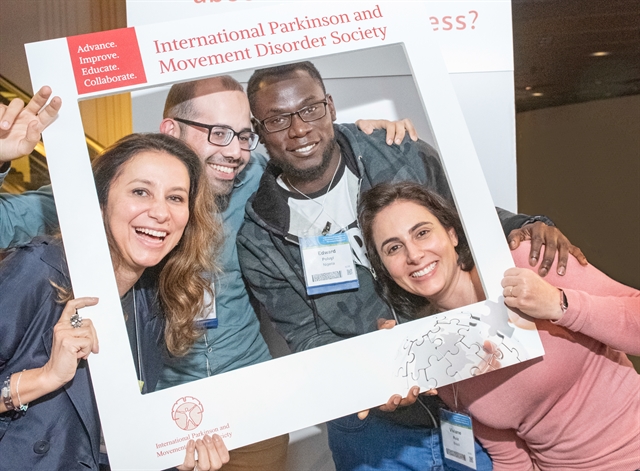
Join MDS
Members gain access to case videos, peer-to-peer collaboration opportunities, discounted education, and a variety of specialized programs.

Attend the International Congress
Discover the latest in the field, and connect with leaders from around the globe.











